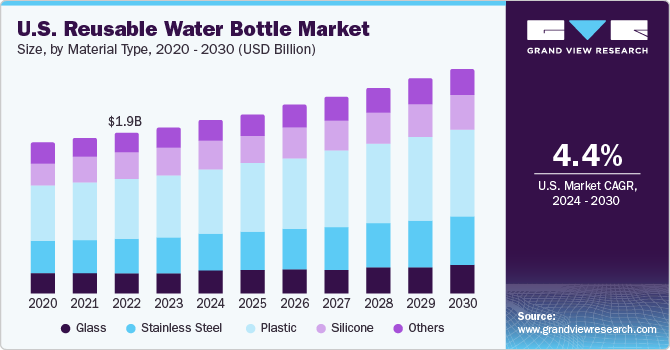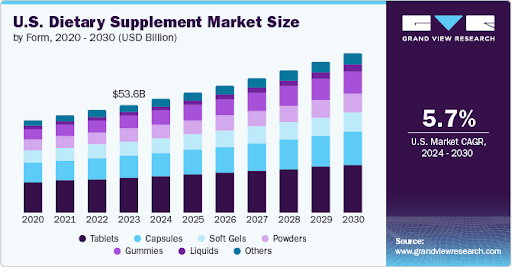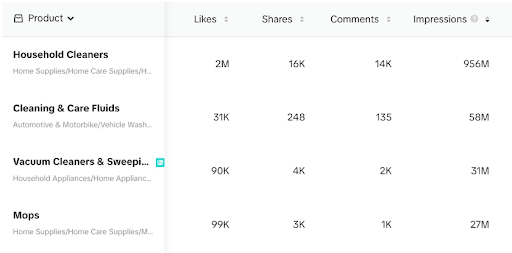White label products are standard goods that have custom labeling. Essentially, you source the products from a supplier and then customize those products to match your branding. So, technically speaking, you could be selling the same product as other businesses—only under a different brand name and identity.
White label products differ from private label products in that private label products are developed exclusively for the business, so other businesses don’t sell the same product.
Choosing the best white label products to sell comes down to choosing products that are profitable, in-demand, and easy to source.
In this post, get suggestions for 10 white label products to sell and why. We’ll also explore sourcing options and tools to help you build and run a profitable store.
1. Cosmetics and Skincare Products
Cosmetics, skincare, beauty, hair care, and personal hygiene products are all great avenues for white labeling. In fact, the global white label cosmetics market was worth $830.99 million in 2023 and is expected to grow annually by 7.11%. Plus, sunscreen is a top white label product industry in China.
In this industry, there’s always a new trend to tap into. The Tangle Teezer hairbrush, for example, went viral on TikTok, presenting an opportunity for many fast-moving entrepreneurs.
If this is a route you’d like to explore, check out the top players in the white label cosmetics products industry:
Here are some white label cosmetics and related products that are popular for white labeling:
- Anti-aging cream
- Bar soaps
- Bath salts
- Body lotion
- Exfoliating scrubs
- Face serum
- Facial cleanser
- Facial mask
- Hair styling products
- Hand sanitizers
- Lip balm
- Makeup removers
- Shampoo and conditioner
- Shaving creams
- Sunscreen
Related: How to Sell Private Label Cosmetics
2. Water Bottles
Reusable water bottles and tumblers are another popular white label product. They’re in constant demand as the public grows more weary of plastic’s impact on the environment and contaminated bottled water. Overall, the reusable water bottle market was valued at $9.28 billion in 2023 and is expected to grow annually by 4.4% from 2024 to 2030.
The top materials for reusable water bottles include plastic, stainless steel, silicone, and glass.

The reusable water bottle market in the US is expected to continue to grow significantly in the coming years.
Plus, they can earn a healthy profit margin. According to our estimates, vacuum-sealed steel tumblers bring in a profit margin of 48.10% to 49.20%.
You don’t even need to do market research to validate this product idea—we’re willing to bet most people you know already have one. It’s mostly a matter of finding quality and competitively priced water bottle and tumbler products to source.
3. Fitness Accessories
There’s almost always a new workout or fitness trend that gives white labelers a new business opportunity to jump on. Globally, the fitness equipment market was valued at $16.04 billion in 2022 with forecasts to grow annually by 5.3% from 2023 to 2030.
Top products include cardiovascular and strength training equipment. Plus, tried-and-true accessories like yoga mats, free weights, and resistance bands can yield healthy profit margins. For example, we estimate that resistance bands net a profit margin of about 40.80% to 44.20%.
If you’re looking for more ideas on fitness accessories to white label, consider the following list as a starting point for brainstorming:
- Ab rollers
- Ankle weights
- Exercise balls
- Exercise sliders
- Fitness gloves
- Foam rollers
- Jump ropes
- Kettlebells
- Massage guns
- Sweatbands
- Water bottles
- Weightlifting belts
- Workout towels
- Yoga blocks and wheels
4. Eco-friendly Goods
Globally, consumers are becoming more environmentally conscious in their lifestyles and spending habits. In fact, 80% of consumers would pay up to 5% higher prices for sustainably produced goods. That means you have the potential to reduce your environmental impact while boosting your business’s bottom line.
So what are some examples of sustainable goods to white label? Well, the possibilities are truly endless. Here are some ideas to get your wheels turning:
- Bamboo hair and toothbrushes
- Beeswax food wraps
- Biodegradable packaging
- Compostable cutlery, straws, and food containers
- Cork phone cases
- Eco-friendly cleaning products and laundry detergent
- Natural deodorants
- Organic cotton or linen clothing and towels
- Plant-based skincare products
- Recycled paper notebooks
- Reusable produce and shopping bags
- Solar-powered gadgets
- Sustainable candles (e.g., soy or beeswax)
5. Supplements
Supplements and vitamins are a commonly white labeled product category. This is likely because a lot of product development and research goes into creating these items since they’re typically orally consumed by customers. This means health and safety is of even greater importance than usual. Developing your own edible products can require a significant upfront investment—one you can bypass by white labeling these items instead.
Plus, it’s a huge and growing market. Estimates say dietary supplements were worth about $177.50 billion in 2023 and are expected to grow annually by 9.1% from 2024 to 2030. Top products include tablets, capsules, gummies, soft gels, powders, and liquids.

The dietary supplement market is expected to grow in the coming years, especially gummies and capsules.
Protein powders and bars are other common white label products that can fall under this category. You can source these items from a supplier like NuCare Nutrition, Your Brand Nutrition, or Makers Nutrition.
6. Fashion and Apparel
Clothing is almost always a surefire way to start selling online. It’s a massive market worth an estimated $1.7 trillion. Apparel is a versatile market, as there are so many types of clothing and styles to choose from. Plus, trends come and go so quickly that there’s always something new to offer that is in demand.
You can also look into related fashion products like jewelry, bags, and footwear. Sunglasses, for example, can net you a profit margin of up to 4,233.33%, according to our estimates. Jewelry, in particular, can yield very high profit margins, as much as 4,900% per our estimates as well. Plus, sunglasses and jewelry are small and lightweight, making it easy and inexpensive to ship and fulfill orders.
7. Home Cleaning Supplies
Household cleaning supplies have become particularly popular on TikTok—in fact, these products earn about 956 million monthly impressions on the video-based social media app, earning the moniker “CleanTok.” From non-toxic cleaners and detergents to innovative little gadgets, there’s plenty of space on “CleanTok” for all kinds of white label products.

CleanTok is a highly engaged and highly monetizable corner of the internet.
8. Phone Accessories
Considering over 97% of Americans own a cell phone, there’s a big market for phone accessories. Plus, as phone manufacturers regularly release new models, there’s an unending need for compatible phone accessories.
Some ideas for phone accessories to white label include:
- Car phone holder
- Charging cable
- Phone case
- Portable charger
- Remote scroll and page turner
- Wireless charger
9. Coffee and Tea
At-home coffee products are forecasted to hit $11.7 billion in 2024 with an annual growth of about 2.1%—most of which is anticipated to be in the US. So there’s a huge market here as more consumers consider themselves at-home baristas.
Plus, you don’t have to stick to traditional coffee. Niches like mushroom coffee and matcha are just a few examples of ways to tap into this industry. You can also tap into coffee accessories and gadgets—think milk frothers, french presses, coffee makers for travel, and more.
10. Kitchen Gadgets
Speaking of gadgets, brands and manufacturers are always cooking up new kitchen gadgets for consumers to play with. In the US alone, kitchenware is expected to generate $6.45 billion in revenue in 2024, with projections to grow 3.31% annually through 2029.
Anything that can uplevel the skills of a home cook is worth pursuing, not to mention gadgets that bring convenience to the kitchen. Consumers are also seeking more sustainable kitchen goods.
Here are some ideas for your own white label kitchen products:
- Coffee grinders
- Digital kitchen scales
- Egg slicers
- Electric kettles
- Food choppers
- Herb scissors
- Ice cube trays
- Manual juicers
- Microwave covers
- Reusable coffee pods
- Silicone baking mats, food bags, and accessories
- Spiralizers
- Vegetable peelers
How to Find Profitable White Label Products
If you want to sell white label products, there are a few key approaches you can take to find profitable items:
- See what’s trending. Use tools like Google Trends, Amazon Best Sellers, TikTok trending topics, and other platforms that allow you to see what people are searching for and talking about. Then head to Google and see if you can find white label product suppliers to tap into those trends.
- Check out Alibaba. Alibaba is an excellent place to source products. Scan the marketplace to find low-cost items you think will resonate with your audience. Of course, you’ll need to work with the manufacturer on customization and branding.
- Niche down. Some trends are very generic. Take coffee, for example. Coffee is so broad and covers so many different things and products. But when you focus on something more niche like matcha, you can see there are specific mugs, mixers, frothers, and more that are perfect for white labeling.
- Analyze your competitors. Identify competitors in your industry and keep an eye on what they’re doing. If you notice something gaining traction, do some research to see if there’s a way you can jump on the trend too.
- Use product research tools. If the above tactics sound tedious and manual, that’s because they can be. However, platforms like Jungle Scout, Helium 10, and SaleHoo can help identify profitable products by providing data on sales volume, competition, and average prices.
Related: Product Sourcing Guide: How to Source Products
Where to Sell White Label Products
If you’re sold on the idea of selling white label products, you’ll need to figure out where you’ll make these items available for purchase. Here are some options:
- Your ecommerce website. Build or update your own online store with white label products for sale. Focus on building a strong digital brand presence to earn trust and sales.
- Amazon. Amazon is prime for selling white label products. It’s the world’s largest online marketplace. The only trick is standing out from the crowd.
- Social media. Social commerce is growing, and there’s no reason you can’t sell your white label products. Set up a Facebook Shop, Instagram Shop, or TikTok Shop to monetize your social audience.
- Your retail store. If you have your own physical retail space, make your private label products available in-store. You can also take this approach if you have a service-based physical business—like a hair salon selling white label hair care products or a gym selling white label fitness accessories.
- Other retail stores. You don’t need your own space to break into retail. See if there are physical retailers in your niche open to sourcing products from outside suppliers.
- Markets and events. In-person selling isn’t limited to a physical retail space. Check out markets and events in your area where you can set up a table or booth and offer your items to local shoppers. You could even travel for events relevant to your niche.
Frequently Asked Questions (FAQs)
Yes, selling white label products can be profitable if you source the right items, build a strong brand presence, and price strategically. It’s not as simple as sourcing the products and listing them online—you’ll need to build a strong brand first.
Some examples of white label products include:
- Cosmetics
- Skincare
- Hair care
- Water bottles
- Fitness accessories
- Sustainable goods
- Supplements
- Fashion accessories
- Clothing and apparel
- Home cleaning supplies
- Phone accessories
- Coffee
- Tea
- Kitchen gadgets
No, white labeling is not illegal. There may be legal guidelines depending on the product and your location, but white labeling itself is not inherently illegal.
Bottom Line
From cosmetics and fitness accessories to eco-friendly goods and kitchen gadgets, there are countless options to explore for white labeling. It all comes down to choosing high-demand and profitable products, sourcing them effectively, and building a strong brand presence.
With the right strategy—whether selling on ecommerce platforms like Amazon, through your own website, or in retail stores—white labeling can offer a scalable business model that aligns with market trends and consumer needs.